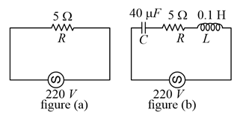EASY
Earn 100
In an alternating current circuit, Some elements are connected in series, out of them, a bulb is used as the resistor. If we increase the frequency of alternating source, the brightness of the bulb also changes, which is given in List-I. According to change in the brightness, select the correct elements given in List-II.
List-I
List-II
(P)
If the brightness of the bulb increases, then
the elements should be:
(1)
Inductor and resistor
(Q)
If the brightness of the bulb decreases then
the elements should be
(2)
Capacitor and resistor
(R)
If the brightness of the bulb first increases
and then decreases, the elements should
be
(3)
Only resistor
(S)
If brightness does not change significantly
then the elements should be
(4)
Inductor, capacitor and resistor
the elements should be:
the elements should be
and then decreases, the elements should
be
then the elements should be
(a)
(b)
(c)
(d)
42.86% studentsanswered this correctly
Important Questions on Alternating Current
EASY
MEDIUM
EASY
?
MEDIUM
MEDIUM
EASY
EASY
EASY
EASY
MEDIUM
MEDIUM
MEDIUM
EASY
EASY
EASY
EASY
HARD
Two circuits are shown in figure and . At a frequency of _______ the average power dissipated in one cycle will be the same in both the circuits.

MEDIUM
EASY
HARD

